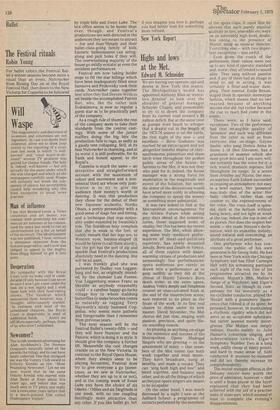New York Report
Highs and lows at the Met.
Edward M. Schneider
We are having our operatic ups and downs in New York this season. The Metropolitan's board has appointed Anthony Bliss as 'executive director' to look over the shoulder of general manager Schuyler Chapin, and presumably to try to to divert the company from its current road toward a $6 million deficit. But at the same time as gossips were heard to whisper that a drastic cut in the length of the 1975-76 season is on the cards, the first night of the new — and excellent — Boris Godunov was marked by an extravagant and not altogether tasteful display of chrysanthemums, poinsettias and sham birch trees throughout the posher public areas of the house. In fairness to the Met, it was not they who paid for it; indeed, the house manager was a strong force for moderation in the magnitude and extent of the foliation, but surely the donor of the decorations would have acted more nobly in allowing the company to spend the money on something more substantial.
It was rare indeed to find at the Metropolitan encouragement for the Artistic Future while seeing grey days ahead at the conservatories, those supposed nests of vitality, but this has been my recent experience. The Met, while allowing some truly mediocre performances of meat-and-potatoes repertory, has newly mounted Jenufa, Boris and Death in Venice, all of them replete with heartwarming virtues of production and surpassingly fine performances: opera audiences are rarely so drawn into a performance as to gasp audibly as they did at the climax of Martti Talvela's Boris death scene. In the same opera, Andrea Velis's deeply sad Simpleton created an unaccustomed hush at the end of the insurrection scene, now, restored to its place as the finale of the work. In its first real chance to shine under its new master, David Stivender, the Met chorus did just that, singing with passion, precision, and quite Slavic-sounding vowels.
As pleasing as anything on-stage is the existence and success of the Metropolitan Opera Madrigal Singers who are proving — to the amazement of many — that members of the Met roster can both work together and read music. They have, broadcast, sung at benefits, and made a record. They can "sing both high and low" and blend together, and balance each other, and do all the things of which archetypal opera singers are meant to be incapable.
On the other hand, I was much distressed by a sight I saw at the Juilliard School: a programme of extracts performed by the members of the opera class. It must first be allowed that such purely musical qualities as line, ensemble etc were on an admirably high level, doubtless owing to the presence of Martin Isepp as musical director. Everything else — with two important exceptions — was awful.
Even given the youth of the performers, their voices were not up to any kind of operatic standard and, worse, they all tended to sound alike. They sang without passion and, if any of them had an image in mind to aid in acting, it was certainly a flour-and-water dum pling. Their mentor, Emile Renan, staged them in operatic stereotype fashion, which means that no one reacted because of anything anyone else did, but rather because the cue to react had come in the music.
There were, as I have said, exceptions. Two of the performers had that intangible quality of 'presence' and each was different from the other as well as from everyone else on-stage. Gayna Sauler, who sang Donna Anna in Scene 1 of Don Giovanni, has a grandness of manner which she must grow into and, I am sure, will; she certainly has the voice for it: a rich, round, dramatic soprano, full throughout its range. In a scene from Ariadne auf Naxos, the mez zo-soprano Faith Esham succeeded in creating an atmosphere: not easy in a brief extract. Her 'presence' was, truly that of the actor: Her body clarified, rather than ran counter to, the _expressiveness of her voice. The voice itself is splen did, dark at the bottom without being heavy, and not light or weak at the top; indeed, the top is one of its glories. Nor does she neglect her words — she made Strauss's decla mation, with its snakelike melody, sound natural and convincing, an attribute of a great performer.
One performer who has convinced the public of his own greatness is Sir Georg Solti. He has been in New York with the Chicago Symphony and has filled Carnegie Hall with his screaming partisans each night of the run. One of his programmes attracted me by its oddness: Mozart's 39th, Mahler's Songs of a Wayfarer, and Elgar's.
Second. Solti, as though to compensate for his notoriety as a six-cyclinder conductor, played the Mozart with a gossamery liquescence that robbed it of its spine; he persisted, however, in maintaining a rhythmic rigidity which did not serve as an acceptable substitute, but rather seemed merely incongruous. The Mahler was simply' tedious, thanks mainly to Julia Hamari's colourless singing and indeterminate vowels. Elgar's Symphony Number Two is a long work, oddly cheap at many points, and hard to make sense of; Solti conducted it moment-by-moment and did not thereby increase its comprehensibility.
The muted trumpet effects in the Debussy encore. were worth the
price of admission, however — that is until a brass player in the foyer explained that they had been achieved with the aid of a practise mute of some sort, which seemed at least to complete the evening's disappointment.


































 Previous page
Previous page